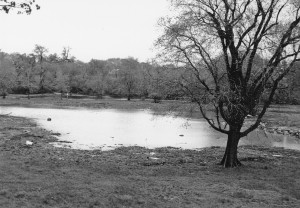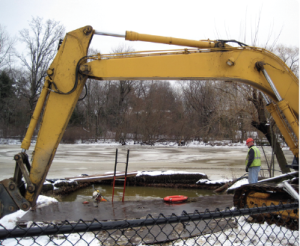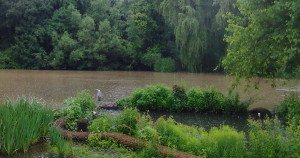Amenities
- Size: Hall’s Pond – 3.5 acres; Amory Woods – 1.56 acres
- Protection: Article 97, NR, SR, LHD
- Precinct: 1
- Inventory Date: October 12, 2004, revised February 1, 2005
- Vicinity: Amory playground, condo buildings, single-family homes and a parking lot

What is a Wildlife Sanctuary?
Hall’s Pond is one of Brookline’s three wildlife sanctuaries. It is owned by the Town and managed by the Brookline Conservation Commission. Brookline sanctuaries have been set aside to maintain habitats for wildlife and to protect the Town’s groundwater resources. People also need our wildlife sanctuaries, whether for studying nature or for quiet moments in a natural setting.
Sanctuaries are different from parks. They protect ecosystems— tangled networks of living things which depend on each other— that cannot survive the mowing, raking and planting that are needed in parks. Nor can they tolerate the disruptions caused by intensive recreational use.
Brookline sanctuaries contain wetlands, including ponds, streams, and vernal pools. These resources are valuable for holding floodwater and replenishing ground water. Since 1972, wetlands have been protected under the Massachusetts Wetland Protection Act.
From “Hall’s Pond Sanctuary,” a brochure produced by the Town of Brookline in 1999
↓ Download Brochure & Trail Guide (PDF)
Hall’s Pond Sanctuary
Hall’s Pond Sanctuary is one of only two natural ponds remaining in Brookline. Together with the adjacent Amory woods, it is the only land in North Brookline set aside for conservation purposes. The sanctuary, which is administered by the Brookline Conservation Commission, consists of a pond, wetlands, an upland area, a formal garden area, and a short trail with wetland overlooks that circles the pond.
While most of the land and water within the sanctuary have been left in a natural state, there is a formal garden that was planted shortly after the turn of the century and cultivated ever since. The sanctuary comprises lush growth of trees, vines and bushes, which provide an excellent habitat and nesting grounds for a wide variety of birds and animal life rarely found in an urban setting.
Amory Woods
Amory Woods was incorporated into and connected to Hall’s Pond in 2000. The total area covers approximately 3.5 acres.
Amory Woods has a small wetland, handicapped accessible nature trail, and a gazebo. The pond and uplands provide habitat for a variety of birds including great blue herons, black-crowned night herons, kingfishers, and red-winged blackbirds. With no spring or stream feeding the pond, the source of the water in the pond is rainwater falling in the surrounding heavily developed urban land.
Activities
The sanctuary is used for habitat for plants and animals, environmental education and passive exploration. Active recreation, such as ball games, bicycling and dog walking are not permitted inside the property.
 History
History
Well into the 1800s, the sanctuary was part of Cedar Swamp. Minna Hall, a co-founder of the Massachusetts Audubon Society, owned it in 1896. About 1910, Charles A. Newhall acquired the land between the pond and Beacon Street and built apartment buildings and formal gardens. Hall’s Pond was reduced to its present size around 1948 when a dam was constructed to the west of the pond and the land was filled to create Amory Playground. The town purchased the property in 1975 as its first conservation land. In 1976, the Friends of Hall’s Pond was founded by Josephine Albrecht and other citizens to assist the Conservation Commission in managing it.
The 2000 restoration project included the unification of Amory Woods with the sanctuary, the enhancement of the sanctuary’s ecological integrity and improvements to the water quality and wetland habitat.
The town acquired Amory Woods in 1977 from the Massachusetts Association for the Blind. The sanctuary and Amory Woods are located within the Cottage Farm Historic District.

grate due to recent storm damage. Photo Credit: Heather Charles Lis
Improvements
The sanctuary saw extensive improvements in 2002, with existing wetlands restored and new wetlands created, improvements to drainage into Hall’s Pond, new fencing, a new boardwalk around the pond, installation of commemorative granite piers, and the upland transformed by removal of invasive plant species and replanting with native species. The pathway system in Amory Woods was improved in 2005.
Deed / Title / Restrictions
It is listed on the State and National Register of Historic Places and is located within the Cottage Farm Historic District.


1 Sighting